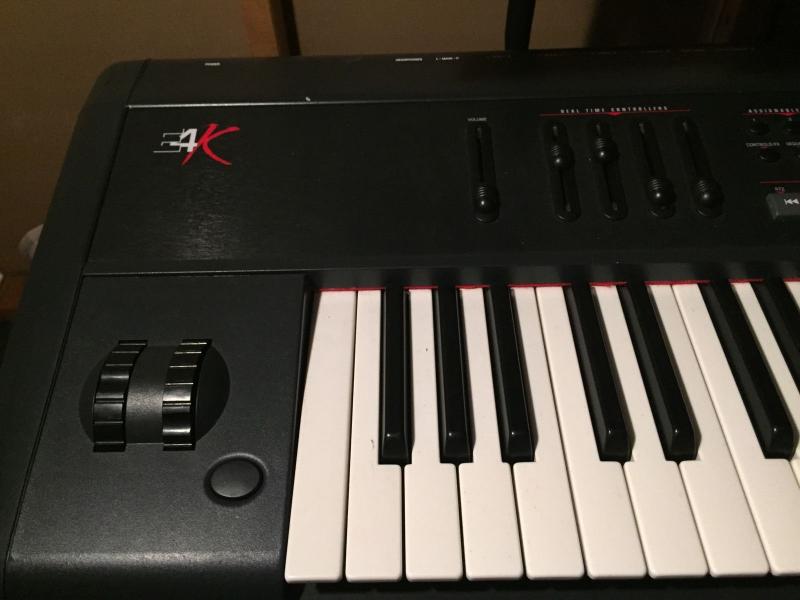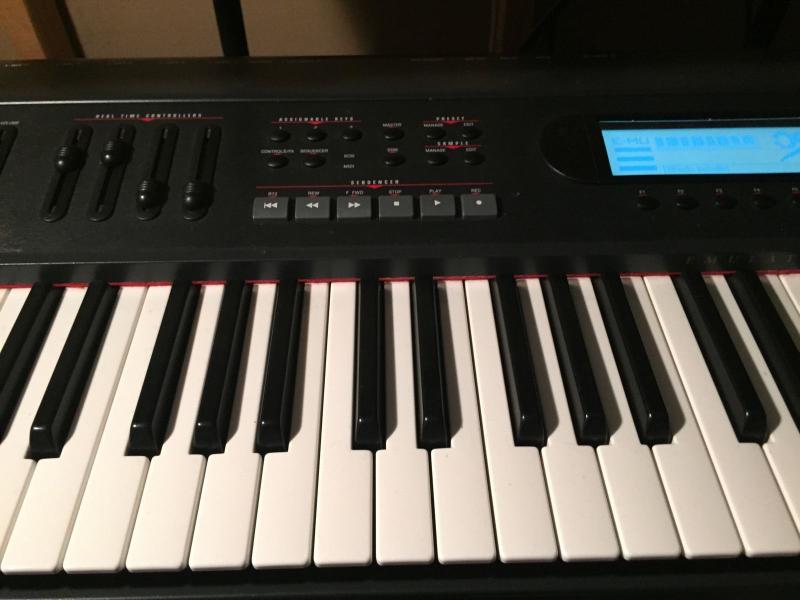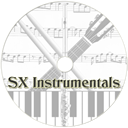Filter on ALL, SYNTH, DRUM, SAMPLER or MISC |
Total list currently 2405 items in 330 Brands |
E-mu | E4K |
Description | The Emulator IV Keyboard The E4K was designed to be the ultimate in professional sampling keyboards. The features of the E4K expand the state-of-the-art in performance instrument design, from ease of use to the impeccable audio specifications. For starters, the E4K contains an incredible 64 channels of polyphony (32 stereo) and is expandable to 128 channels. The basic E4K comes with 4 Megabytes of sample memory, but this is also user-expandable up to 128 megabytes with standard SIMM modules. With fully expanded memory, the E4K provides over 24 minutes of sampling time! Performance Features The 76 note (6 octave) keyboard on the E4K is slightly weighted for a responsive feel and responds to velocity and pressure. Four realtime control sliders are integrated into each of the factory sounds to control the most useful aspects of timbre according to the nature of each preset. The realtime control sliders can be easily reprogrammed to control any parameter on the E4K. In addition to the standard pitch and mod wheels, a new “Thumby button” puts a control switch at your thumb tip. The Thumby button is quite handy to control such things as rotating speaker speed, timbre or any other programmable function on the E4K. Sequencer and Data Filer The onboard sequencer is capable of reading and playing back standard MIDI files (format 0 & 1) direct from a DOS floppy disk and saving them to the internal hard disk drive. Music sequences can be stored within E4K banks or as separate objects. Sound Libraries The E4K has full access to the huge library of sounds available from E-mu and other sources. It is fully compatible with the legendary E-IV, e-64, EIII, EIIIX and ESI-32 libraries, and can transparently read Emax II, Roland S-760 and Akai S1000/S1100 banks as if they were its own. Sound Storage The E4K can access up to 1000 samples per bank arranged in up to 1000 presets. The 50-pin SCSI interface provides access to high density media such as hard disks, magnetooptical disks or CD-ROM. The integral 3.5" floppy disk drive provides a convenient means of updating the E4K software which is periodically being enhanced and improved. Most software upgrades will be mailed free to registered owners. Our exclusive SoundSprint™ function automatically loads presets from the hard disk as you browse through them. You can continue to play while the new preset is loading in the background. Other professional features include selectable sample rates of 22.05 kHz, 24 kHz, 44.1 kHz, and 48 kHz. D/A converters are 18-bit linear for wide dynamic range with multiple channels. The Sigma-Delta A/D converters are 16-bit linear. Sampling can be performed in either mono or true stereo. Advanced DSP The E4K’s advanced features make sampling a breeze. Samples can be automatically truncated, normalized and placed on the keyboard as the sample is taken and advanced tools such as Auto Correlation, Loop Compression and Crossfade Looping allow even the most difficult sounds to be easily looped. Samples can be digitally spliced and mixed with other samples, and dynamically controlled from the keyboard using velocity and positional crossfading and switching functions. Advanced digital processing features such as Sample Rate Conversion, Compression, Parametric Equalization and Digital Tuning allow you to shape raw samples more quickly and with greater precision than computer based systems. Samples can be quickly and easily transferred between the E4K and an external computer via SCSI if so desired. Additional digital processing functions include: Time Compression and Expansion, which shorten or lengthen the time of samples without changing the pitch; Pitch Change, which changes the the pitch of a sample without altering the time; Transform Multiplication, which can be used to create weird and wonderful new timbres; and Dopplerization, which allows you to move samples forward and backwards in space as well as from side to side. Built-in Digital Effects The E4K incorporates a high quality internal effects processor to add reverb and chorus effects while keeping the sound in the digital domain. 71 different effects are currently implemented. There are several controllable parameters for each effect and any realtime control can be assigned to control these parameters in performance. Sounds with effects applied can easily be resampled and then saved as an entirely new sound with ambience and effects included. Digital Hardware Features The E4K’s digital hardware implements up to 64 Z-plane filters. These digital filters are very “analog-sounding” and currently implement the following types of filters: • 12, 24, or 36 dB/octave Lowpass filters with resonance • 2nd & 4th order Highpass filters with resonance • 2nd & 4th order Bandpass filters with resonance • Contrary Bandpass filter • Three types of swept EQ filters • Three Phasers and one Flanger with resonance • Six powerful Morphing filters Modulation sources include three multi-stage envelope generators and two multi-wave LFOs per channel, as well as a full MIDI modulation control over virtually every parameter. The digital patchbay also contains a set of arithmetic modifiers which allow you to create complex synthesis models. The E4K is 16 part multi-timbral, allowing complex sequencing and sound effects creation, and can be controlled by remote control using an external computer. A MIDI expander card is available which increases the number of MIDI channels from 16 to 32 channels. • Eight polyphonic audio outputs allow you to mix and process specific sounds. • Resampling - The E4K can resample its own output in the digital domain for layering and the creation of new and exciting effects. • IBM compatible ASCII keyboard interface controls all E4K operations including naming and browsing. • A digital interface (S/PDIF & AES/EBU) is another standard option which facilitates the transfer of stereo digital audio between digital recorders, mixers, etc. The E4K is based on the latest G-chip and H-chip digital hardware. The G-chip allows smooth sample transposition over a 10-octave range while the H-chips retain the warm, musical character of traditional analog filters. The E4K is an extremely powerful and reliable eighth generation instrument. We at E-mu Systems sincerely hope it will help you realize and further your musical potential. |
| Brand | E-mu |
| Model | E4K |
| Device | Synth |
| Type | Keys |
| Engine Type | Digital |
| Engine | Sample |
| Voices (max) | 128 |
| Multitimbral | 16 |
| Oscillators | 4 |
| LFO | 2 Sample & Hold, Saw Up, Saw Down, Sine, Square, Triangle, Clocked, Delay |
| Sampler | 16 bit, 44.1 kHz, 48 kHz. 4MB expandable to 128MB |
| Filter (VCF) | 1 12dB Slope (2-pole), 24dB Slope (4-pole), 36dB Slope , Band Pass, Band Reject, Formant, High Pass, Low Pass, Parametric, Z-Plane |
| Envelope (VCA) | 3 Delay, Attack, Decay, Decay 2, Sustain, Release, Release 2 |
| FX | Dual stereo effects processor |
| Memory | ROM/RAM: 1000 patches |
| Recording | 16 Tracks |
| Keys | 76 |
| Key type | Keys |
| Velocity | Y |
| Aftertouch | Channel |
| Audio | Out: Stereo Main, 3 extra stereo out. In: SPDIF, AES, RCA Stereo L/R |
| Midi | I-O-T |
| Extra info | SCSI connector, Internal Hard drive, 16 Midi channel extra card optional |
| Produced: | 1996 |
| Legend: | Obvious | Y: Yes, N: No, N/A: Not Applicable | |
| VCO | Voltage Controlled Oscillator | DCO | Digital Controlled Oscillator |
| LFO | Low Frequency Oscillator | Sub | Sub Oscillator |
| VCF | Voltage Controlled Filter | VCA | Voltage Controlled Amplifier |
| Velocity | As with a piano, the harder you hit a key, the louder the sound, unlike most organs which always produce the same loudness no matter how hard you hit a key. | Aftertouch | Pressing a key after you activated it. Channel Aftertouch, no matter which key, it will send a Channel message. Poly Aftertouch, sends the pressure per key instead of the whole channel. |
| Values for OSC, LFO, Filter, Envelope are per voice unless stated otherwise. | |||




